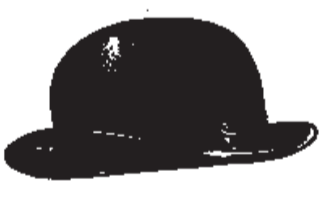The beauty of the thing was, you see, that nothing could possibly go wrong.
—Bertram Wooster
The fact of the antimatter is that we are all prisoners of something—sex or faith, mania or depression, conscience or the lack thereof. The Man in the Iron Mask, c’est moi, the saying goes down here at Motleigh Towers, Slough-of-Despond-on-the-Wold. What is to be done, vis-à-vis amelioration? Slather on a chest-feverish handful of Bolshevik’s VapoRub? Join a glee club, a pyramid scheme, a wandering freak show? (“Elephant-Men and -Women wanted. No professional experience necessary.”) Play the Kinks’ “Sunny Afternoon” on auto-repeat until achieving inert oneness with Ray Davies’s couch-bound satori? Or more ambitiously, take a matchbook correspondence course to start yourself on the way to an exciting new career in a fast-growing, high-paying field like visionary repairman or wastrel-management? To paraphrase the painter Gauguin (as opposed to the pretender in Gauguin vs. Godzilla, 1972): Life being what it is, one dreams of escape. (Revenge was the word he used, but sometimes escape is the best revenge.)
“Jeeves,” announces the eternally youngish, “mentally negligible,” and kaleidoscopically ridiculous Bertie Wooster to his incomparably astute and invariably lifesaving valet, very near the conclusion of P. G. Wodehouse’s interlocking chain of barminess entitled “The Spot of Art,” “flight is the only resource.” Flee like a bird is Bertram’s when-in-doubt policy, writ large in the codex of the Wooster DNA, whether said hightail is from the sulfurous wrath of nephew-crushing aunts, the clutches of insidiously industrious, character-building fiancées, the talons of eagle-eyed booby-hatch operators, a gainful career (make that any sort of employment at all), or “the awful majesty of the Law.” Jeeves serves as his perfect, virtually omniscient flight-planner and facilitator, in addition to the cerebral one’s impeccable credentials as a gentleman’s gentleman, hangover reliever, sermon handicapper, and all-round caretaker/giver: the kind of guardian seraph who could have sprung Sisyphus from the underworld and then gotten them both booked on a restorative round-the-world sea cruise. (No stoic stone-roller, racked Job, or damsel in distress ever needed their bacon saved on a more continuous basis than Bertie.) Over the course of half a century, in Wodehouse’s beatifically timeless series of short stories and novels from Carry On, Jeeves in 1925 to Aunts Aren’t Gentlemen in 1974, the valet distinguished himself as a veritable Houdini of the “narrow squeak,” a virtuoso of proxy music with enough on the eightball to give Spinoza a run for his marbles, the soul of enlightened self-preservation (both of the Wooster s. and his own keenly wide-ranging interests). A wizard when it comes to extricating his employer from the most hopeless situations and dire calamities,...
You have reached your article limit
Sign up for a digital subscription and continue reading all new issues, plus our entire archives, for just $1.50/month.
Already a subscriber? Sign in





